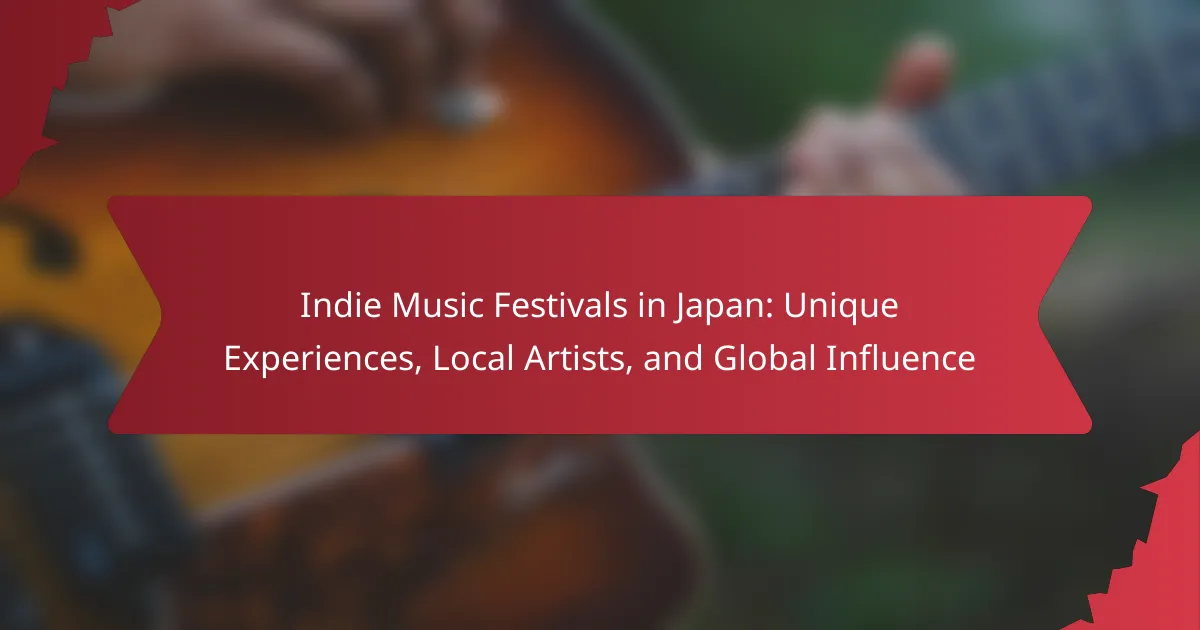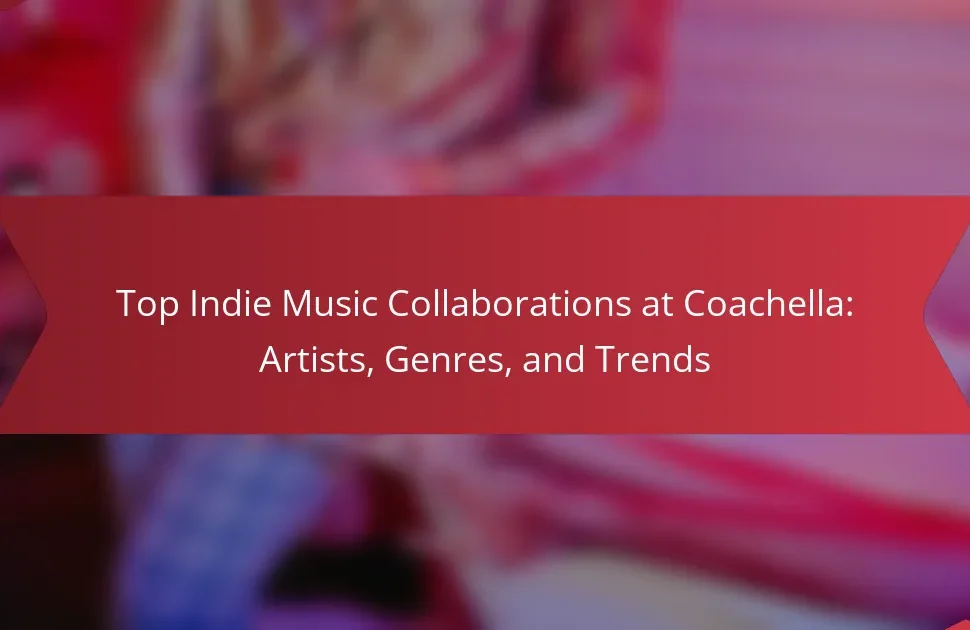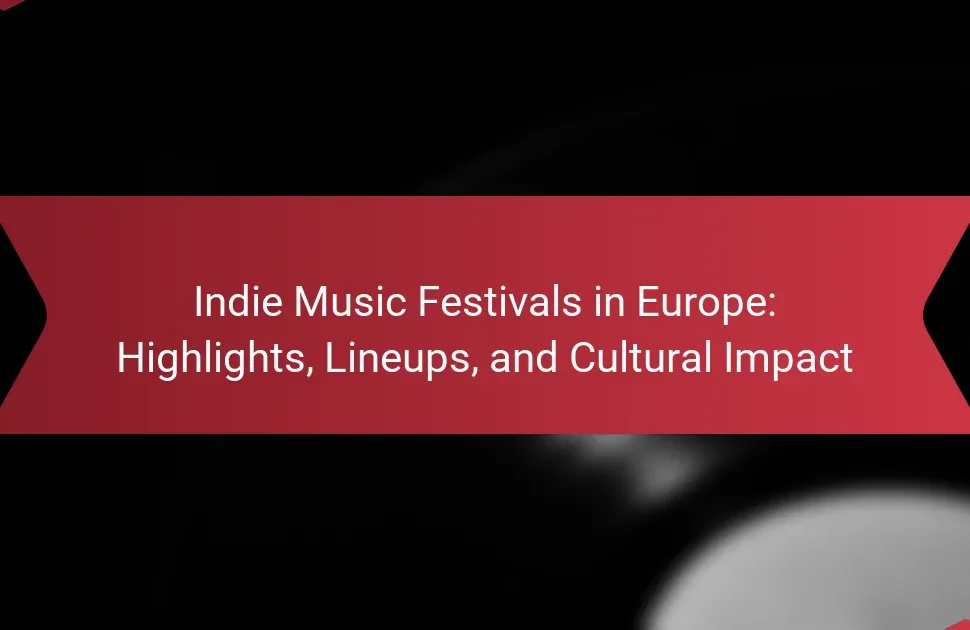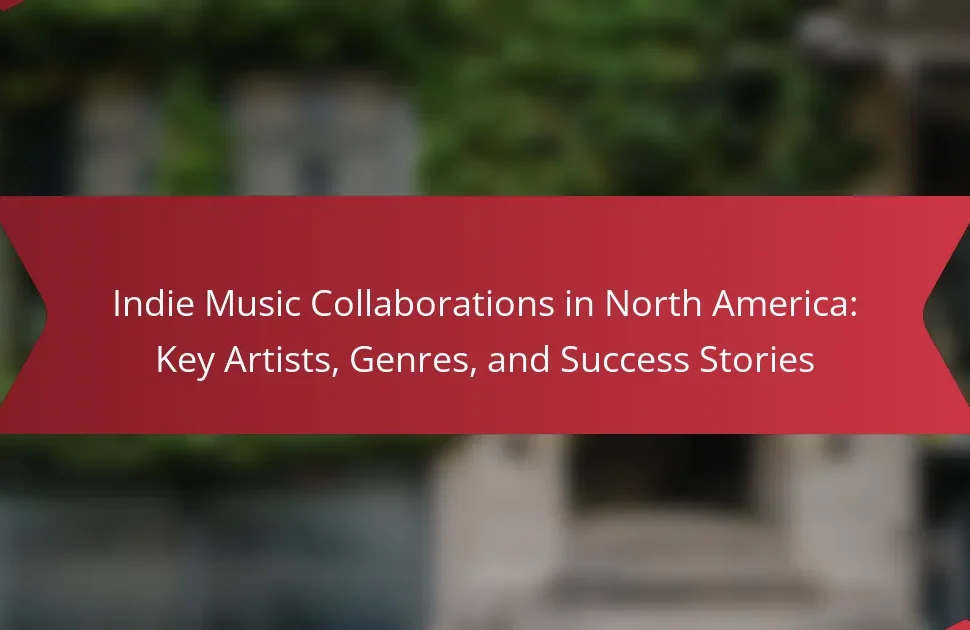Indie music festivals in Japan offer unique experiences that blend local artistry with global influences. These events showcase emerging Japanese musicians alongside international acts, creating a diverse musical landscape. Attendees can engage with local artists, explore cultural offerings, and enjoy picturesque venues. Additionally, these festivals significantly impact global music trends and foster community connections.
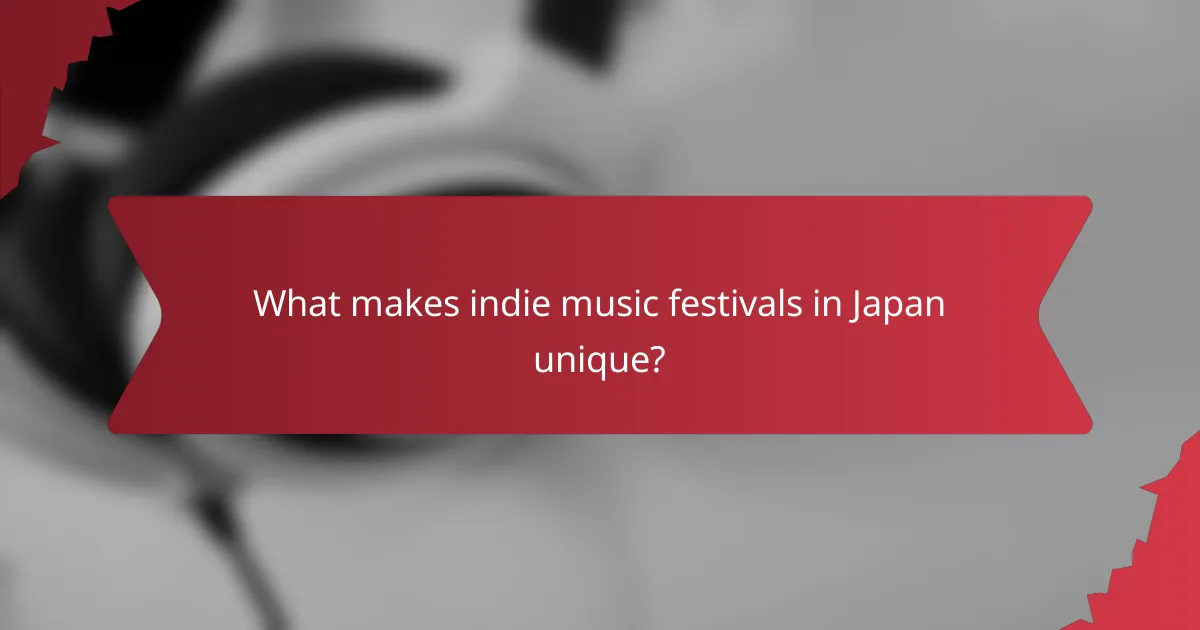
What makes indie music festivals in Japan unique?
Indie music festivals in Japan stand out due to their blend of local artistry, cultural immersion, and unique settings. These festivals often showcase emerging Japanese musicians alongside international acts, fostering a diverse musical landscape. The intimate atmosphere allows for close interactions between artists and fans, enhancing the overall experience. Additionally, many festivals are held in picturesque locations, such as parks or historical sites, which contribute to their distinctive charm. This combination of local talent and scenic venues creates an unforgettable experience for attendees.
How do local cultural influences shape festival experiences?
Local cultural influences significantly enhance festival experiences by integrating traditional practices, regional music styles, and community participation. Japanese indie music festivals showcase local artists, blending global influences with unique cultural elements. This fusion creates a distinctive atmosphere that reflects Japan’s diverse heritage. For example, festivals may feature traditional instruments alongside contemporary indie sounds, fostering a sense of cultural pride and connection among attendees. Local cuisine and art also play vital roles, enriching the overall experience and creating memorable interactions.
Which notable indie music festivals are held in Japan?
Notable indie music festivals in Japan include Fuji Rock Festival, Summer Sonic, and Rising Sun Rock Festival. These events showcase local and international artists, creating unique experiences for attendees. Fuji Rock, held in Niigata, is renowned for its stunning mountain backdrop and diverse lineup. Summer Sonic, taking place in Tokyo and Osaka, features a mix of genres and attracts global acts. Rising Sun, located in Hokkaido, emphasizes a strong local music scene and a vibrant festival atmosphere. Each festival contributes significantly to Japan’s indie music culture.
What role do traditional Japanese arts play in these festivals?
Traditional Japanese arts significantly enhance indie music festivals by creating a rich cultural backdrop. These arts, such as calligraphy, tea ceremonies, and traditional dance, showcase Japan’s heritage and engage festival-goers. They often feature performances that blend music with visual art, providing unique experiences that resonate with local and global audiences. The integration of these arts fosters a deeper appreciation for the artists’ work, enriching the overall festival atmosphere.
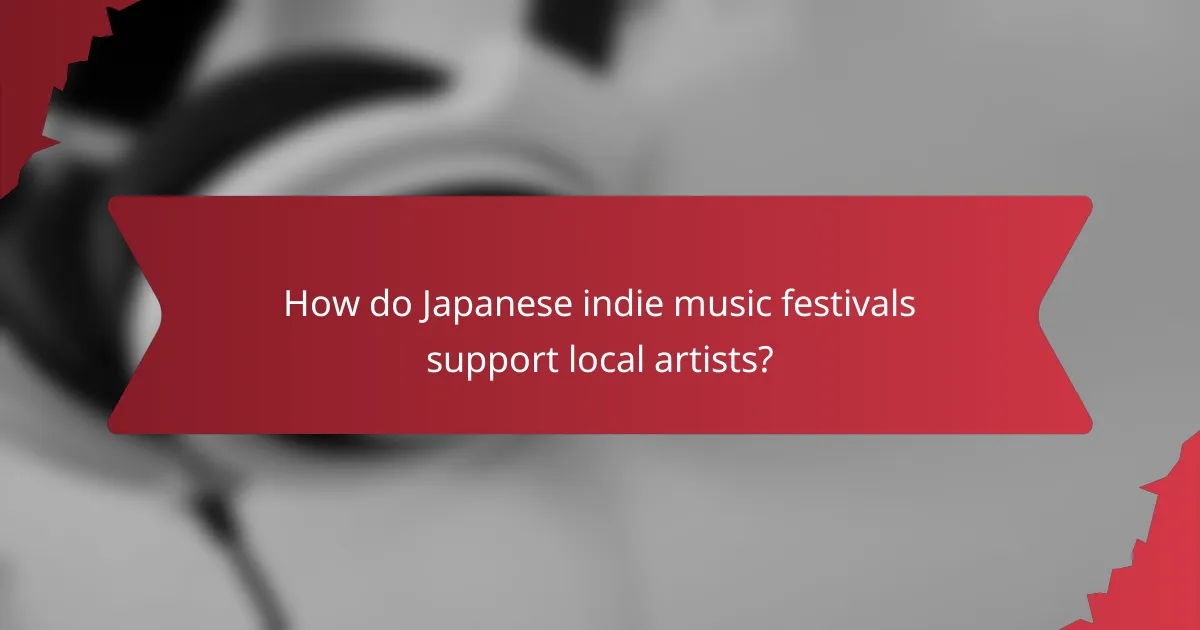
How do Japanese indie music festivals support local artists?
Japanese indie music festivals actively support local artists by providing platforms for exposure, networking, and collaboration. These festivals showcase regional talent, helping artists gain recognition and connect with audiences. They often feature diverse genres, allowing local musicians to share their unique sounds. Additionally, many festivals offer workshops and mentorship opportunities, further enhancing artists’ skills and careers. By fostering a vibrant community, these events contribute significantly to the cultural landscape of Japan.
What opportunities do festivals provide for emerging musicians?
Festivals offer emerging musicians exposure, networking, and performance opportunities. They connect artists with industry professionals and audiences, enhancing visibility. Indie music festivals in Japan showcase local talent while attracting global attention, fostering collaboration and cultural exchange. Additionally, these events provide platforms for artists to gain valuable experience and feedback.
How are local artists promoted during these events?
Local artists are prominently promoted during indie music festivals in Japan through various strategies. These events often feature dedicated stages for local talent, showcasing their music to diverse audiences. Additionally, promotional campaigns utilize social media platforms to highlight artists, share their stories, and engage fans. Collaborations with local businesses further amplify visibility, providing artists with opportunities to connect with the community. Festivals may also include workshops and networking events, enhancing exposure and fostering relationships within the music industry.
What collaborations exist between local and international artists?
Collaborations between local and international artists thrive at indie music festivals in Japan, showcasing diverse musical styles. These partnerships often blend traditional Japanese sounds with global genres, creating unique performances. For instance, local bands frequently collaborate with international musicians, enhancing cultural exchange. Additionally, festivals like Fuji Rock and Summer Sonic feature joint performances, attracting a global audience and fostering artistic innovation.
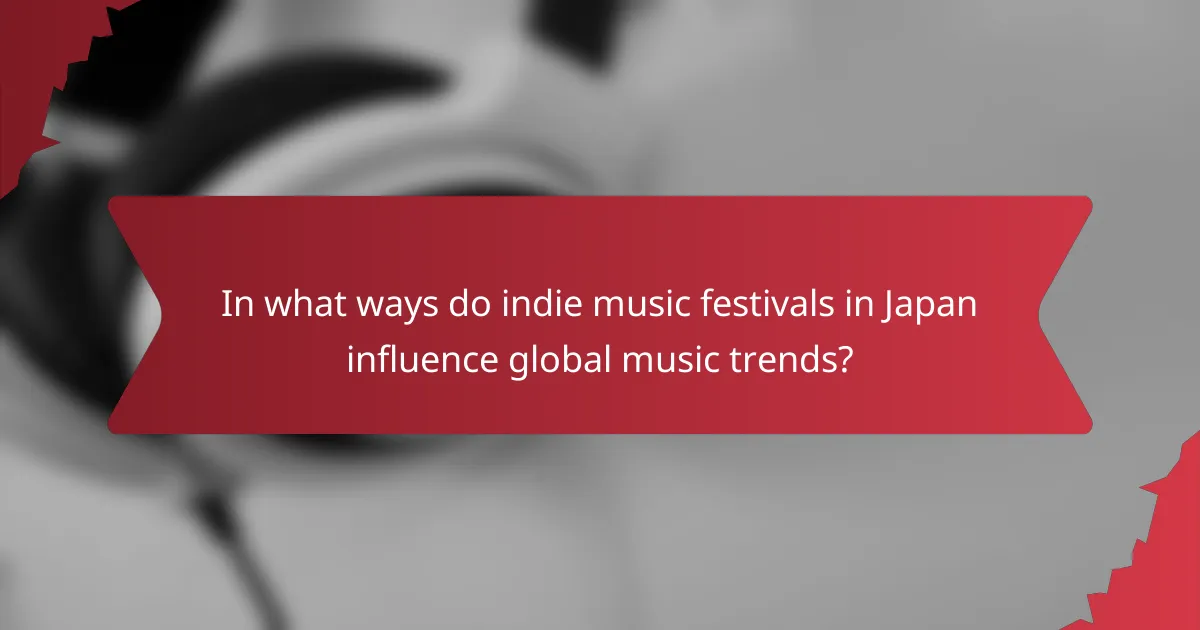
In what ways do indie music festivals in Japan influence global music trends?
Indie music festivals in Japan significantly influence global music trends through unique cultural experiences and local artist showcases. These festivals introduce innovative sounds and styles, attracting international attention. For example, events like Fuji Rock and Summer Sonic feature diverse lineups, blending traditional Japanese music with contemporary indie genres. This fusion inspires global artists and encourages cross-cultural collaborations. Additionally, the emphasis on sustainability and local community engagement at these festivals sets new standards for event organization worldwide. As a result, Japanese indie music festivals play a crucial role in shaping the future of global music.
How do these festivals attract international audiences?
Indie music festivals in Japan attract international audiences through unique experiences, local talent, and cultural immersion. These festivals showcase diverse genres, creating an inclusive atmosphere for global music lovers. Additionally, strategic marketing and partnerships with international artists enhance visibility. Local artists gain exposure, fostering cross-cultural collaborations that resonate worldwide.
Which genres are most represented at Japanese indie festivals?
Japanese indie festivals prominently feature genres such as rock, pop, electronic, and folk. These genres showcase local talent and foster a vibrant music scene. Rock is often the most represented, with numerous bands performing original compositions. Pop music, particularly J-Pop, attracts significant audiences and offers a platform for emerging artists. Electronic music has gained popularity, blending traditional sounds with modern beats. Folk music, while less common, provides a unique cultural experience reflective of Japan’s diverse heritage.
What impact do global music trends have on local festival programming?
Global music trends significantly influence local festival programming by shaping artist lineups and audience expectations. Indie music festivals in Japan increasingly reflect these trends, integrating international acts alongside local artists. This fusion creates unique experiences that resonate with diverse audiences. Festivals curate programming that balances global influences with regional sounds, fostering community engagement while appealing to broader demographics. As a result, local festivals become platforms for cultural exchange, showcasing Japan’s rich musical heritage alongside contemporary global trends.
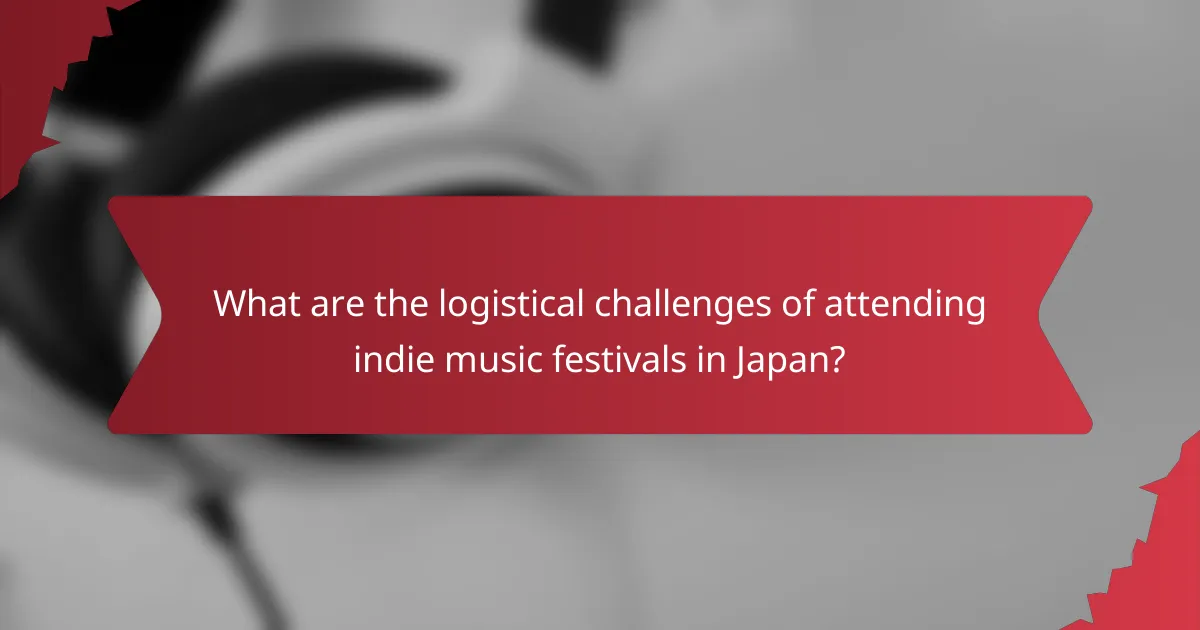
What are the logistical challenges of attending indie music festivals in Japan?
Attending indie music festivals in Japan presents logistical challenges such as transportation, accommodation, and language barriers. Navigating Japan’s extensive public transit system can be daunting for newcomers. Limited English signage may complicate travel plans. Additionally, securing accommodation near festival venues often proves difficult due to high demand. Festivals may occur in remote areas, increasing travel time and costs. Understanding local customs and etiquette is essential for a smooth experience, as cultural differences can lead to misunderstandings.
How do travel and accommodation options vary for festival-goers?
Travel and accommodation options for festival-goers in Japan vary widely based on location and event size. Indie music festivals often take place in urban centers or scenic rural areas, influencing nearby lodging availability.
Larger festivals, like Fuji Rock, offer extensive accommodation options, including hotels, hostels, and camping sites. In contrast, smaller festivals may have limited nearby options, prompting attendees to seek accommodations in nearby towns.
Public transportation plays a crucial role, with many festivals providing shuttle services or easy access to train stations. This accessibility enhances the overall experience, encouraging festival-goers to explore local culture and attractions.
Additionally, some festivals promote unique lodging experiences, such as staying in traditional ryokans or participating in community homestays, enriching the festival experience with local flavor.
What are the best practices for navigating festival schedules?
To navigate festival schedules effectively, prioritize planning ahead and staying flexible. Research the lineup, set personal priorities, and use festival apps for real-time updates.
1. Review the schedule in advance to identify must-see artists.
2. Create a personal timetable, factoring in set times and locations.
3. Stay updated via festival social media for any changes.
4. Allow time for spontaneous discoveries of local artists.
5. Connect with fellow attendees to share experiences and recommendations.
Which common issues do attendees face at these events?
Attendees at indie music festivals in Japan often face issues like overcrowding, limited access to amenities, and language barriers. These challenges can impact their overall experience and enjoyment. Additionally, unpredictable weather can affect event logistics and comfort. Lastly, navigating transportation to and from remote venues can be complicated.
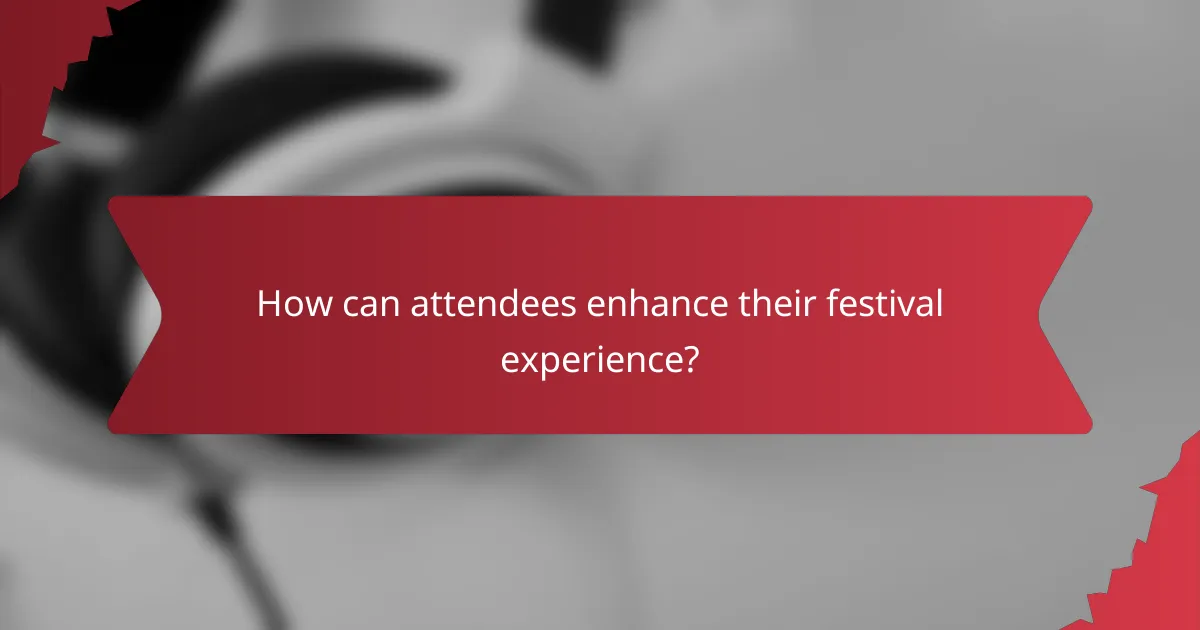
How can attendees enhance their festival experience?
Attendees can enhance their festival experience by engaging with local artists and exploring unique cultural offerings. Participating in workshops, tasting regional cuisine, and discovering hidden venues enriches the overall atmosphere. Connecting with fellow festival-goers fosters a sense of community. Additionally, planning ahead for performances and creating a flexible schedule allows for maximizing enjoyment.
What tips do seasoned festival-goers recommend?
Seasoned festival-goers recommend planning ahead, embracing local culture, and staying hydrated. Arrive early to secure good spots and explore the venue. Familiarize yourself with the lineup and set times to catch favorite acts. Engage with local artists for unique insights and experiences. Bring portable chargers to keep devices powered for sharing moments.
How can attendees engage with artists beyond performances?
Attendees can engage with artists beyond performances through meet-and-greet sessions, workshops, and interactive Q&A panels. These opportunities foster deeper connections and allow fans to learn directly from artists about their creative processes. Festivals often host art installations and collaborative projects, enabling attendees to participate actively. Networking events also provide platforms for discussions between artists and fans, enhancing community engagement.
What are the best ways to discover new music at these festivals?
Explore local artists through curated stages and pop-up performances. Attend workshops to connect with musicians and discover their influences. Use festival apps for personalized recommendations based on your tastes. Engage with social media to follow artists and join discussions. Network with fellow attendees to share music suggestions. Visit merchandise booths for exclusive releases and artist insights.
What common mistakes should attendees avoid during festivals?
Attendees should avoid common mistakes like overpacking, neglecting local customs, and ignoring schedules. These errors can diminish the unique experiences offered at indie music festivals in Japan.
1. Overpacking: Bring only essentials to enjoy mobility and comfort.
2. Ignoring local customs: Respect Japanese culture to enhance interactions with local artists.
3. Missing performances: Check schedules to ensure you don’t miss key acts.
4. Not engaging: Participate in workshops or discussions for a richer experience.
